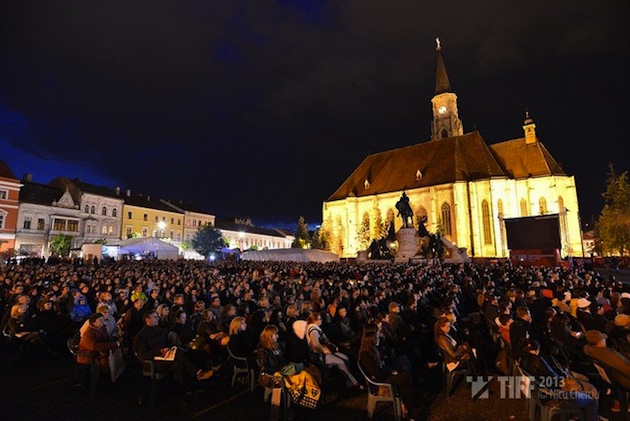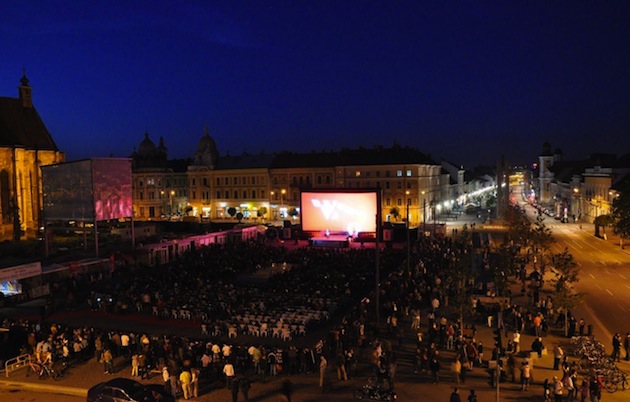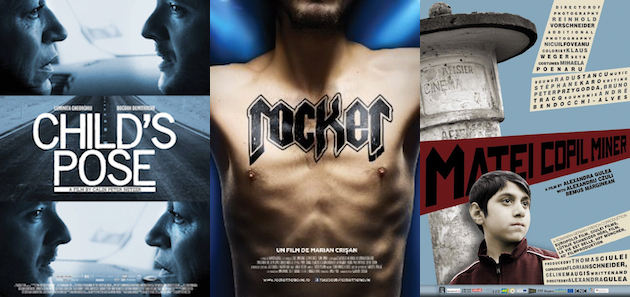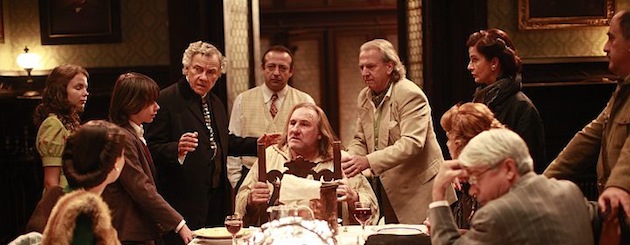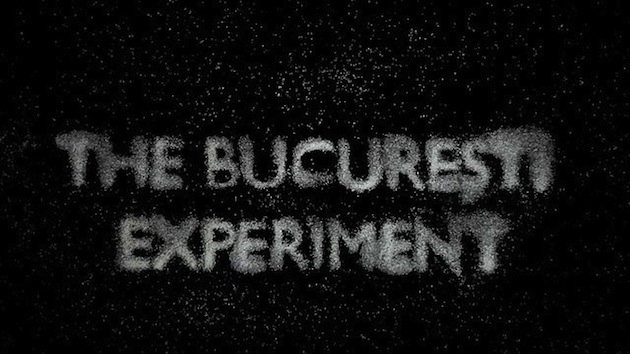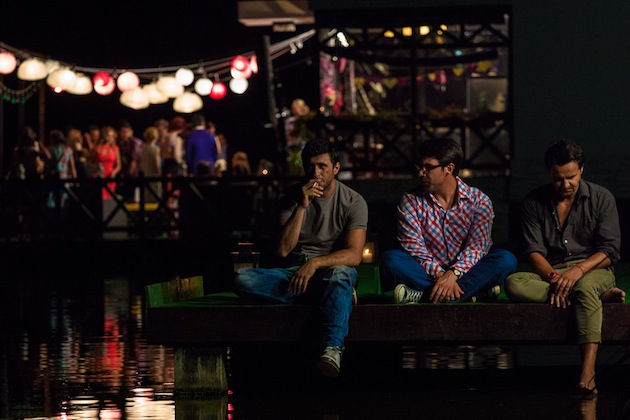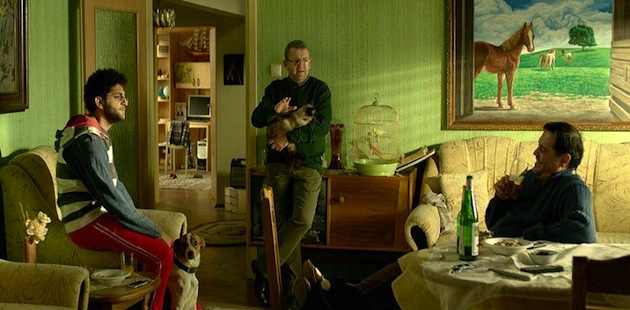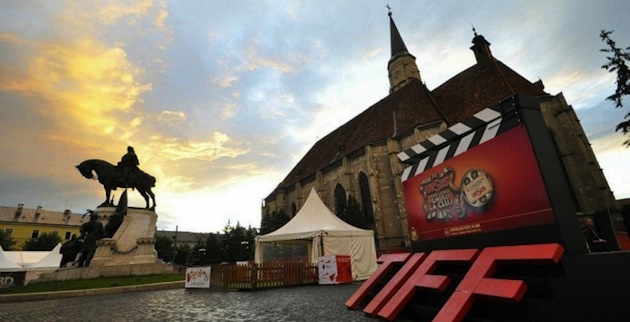Transylvania 2013 Festival Report: The Romanian New Wave Continues
Films like
Stuff & Dough and The Death of Mr. Lazarescu, along with other successes, have put Romania
back on the map of world cinema. All this through a movement that came into notoriety under
the banner of the so-called Romanian New Wave. This long process of rehabilitation of the national
cinema has been embraced by new and talented filmmakers as well as specific film aesthetics.








A Festival Of Size, Scope And Importance
Considering a the rather ambiguous image of Romania in international news, the Transylvania International Film Festival was surprisingly big this past May and June (155 screened features, 40 shorts over the course of ten days), yet managed an incredibly familial and informal atmosphere. The festival promoted mostly young and talented filmmakers (the main competition was focused on first and second features) and European cinema, but programmers had loaded the festival with the latest crop of international films gathered from the festival route charting Venice, Toronto, Rotterdam, then Berlin.
This vast and diverse programming structure also afforded room for filmmaker retrospectives (Oliver Assays, Stephen Frears, Peter Forgács and Eyal Sivan all got the spotlight this year) to widely discussed documentaries (Fuck for Forest, Searching for Sugarman), as well as a focus on three national cinemas (Slovakia, Greece and Hungary). Among special screenings was Kurosawa Kiyoshi TV-series Penance and Ulrich Seidl's Paradise trilogy back-to-back-to-back six-hour run.
Romanian Days: The Wave Continues
However, the sweet spot of the fest was exclusively dedicated to national productions. "It's true, there aren't that many theatres in Romania, which is a major handicap," Chirilov stated, continuing to explain why such an institution as TIFF is crucial for Romanian cinema. "There are big cities with not a single theatre. There's no consistent or systemic strategy designed to optimize the impact and the presence of the Romanian films on the local market. There is no law to protect the visibility of the Romanian films in the cinemas, especially in the multiplexes."
In this way the Romanian Days section brought the freshest and no less interesting productions into the centre of attention. "We were showing no less than 11 features in our official program, and 9 other brand new titles in closed screenings for film professionals and festival representatives. It's an eclectic offering that's gonna surprise all those who think they know what to expect from the Romanian cinema," the artistic director said, summarizing the Romanian Days section.
This section is not only a display of national production, but also a launching pad towards the international orbit. What follows are my thoughts on highlights from the selection. Read on.
Romanian Days: CHILD'S POSE, ROCKER, And MATEI: CHILD MINER
The unofficial headliner could not be more symptomatic of that desire for the internationa stagel than this year´s Golden Bear winner, Child´s Pose (Călin Peter Netzer) bearing all the elements of Romanian New Wave aesthetics, yet still not formulaic.
Regarding the stylistic side, it was hard to not think about The Death of Mr. Lazarescu as Netzer evokes the emblematic film repeatedly, even somewhat referring to it as to the predominant paragon of the New Wave. The story follows a mother (played by remarkable actress Luminita Gheorghiu who starred also in the above mentioned Mr. Lazarescu) on a desperate crusade to redeem her son who has just caused a tragic car accident by any means necessary. The script is incredibly rich, using two solid thematic lines: dysfunctional family relationships and power and corruption. It is also absurd with comic undertones. The perfectly balanced mix of tragic, comic and social realism provoked a few emotional outbursts during the screening due to the sensitive theme of parental upbringing which also serves as a shadowy parallel to the country´s transition from the Ceaușescu era to democracy, notwithstanding that this interpretation was denied by the filmmaker.
Curiously enough, the next three films shared this analogous theme which only proves the plausibility of the theory on the New Wave. Rocker is built upon these same principles minus the comedic element. A son is a rampant drug addict and his father is trying to help him not only break the habit but also to promote his underground rock band. However, the son commits several desperate acts sinking deeper into the mud of addiction and worsening relations with the local mafia. The father uses everything in his power to save his only one son while attempting to rebuild family life, and thus, change his current state of widower.
Rocker is much grimmer than Child's Pose as hopelessness and the son´s indifference growths from scene to scene. Another film, Matei: Child Miner, uses equally monochrome colours as Rocker to depict the uncertain destiny of the main protagonist. Dipping into social realism, Alexandra Gulea uses elliptic and minimalistic storytelling unfolding in three acts to draft a relationship of little Matei to an abandoned region once known for a rich mining complex, while having the parental ties almost completely hacked off due to their work in Italy in order to ensure a decent living.
A FAREWELL TO FOOLS Attracts International Stars
Four more films stood out from the Romanian Days line-up, albeit for very different reasons. The first was A Farewell to Fools, a Romanian-German-Belgian co-production starring Gerard Depardieu and Harvey Keitel alongside a Romanian cast under Bogdan Dreyer´s direction. Set during World War II, a dead Nazi soldier is found near an insignificant village in Transylvania. If culprit won´t step forward by the next morning, a Nazi squad is going to execute the local authorities. The farce starts as soon as the locals begin trying to dodge a sure bullet in the head. The unwilling saviour is local simpleton Ipu (played by Depardieu) who is promised a hero´s funeral in exchange for his sacrifice. The plot is quite predictable, delivering in the end a verified moral message that a village idiot is not really an idiot.
A Farewell to Fools is mostly a film canapé parroting a well-worn theme, bearing no real cinematic significance except a polished production when weighed on the international level.
Romania From The Eyes Of An Outsider: The Films of Tom Wilson
A more interesting pair of offerings came via British filmmaker Tom Wilson. "I came to Romania because it's probably the most exciting, unique place I've ever been to in Europe," Wilson stated. "It's Europe, but it's also not Europe. For years we've been calling it 'The New Berlin', which is partly true - it's got a large, tightly-knit community of people doing creative things, so it's a place where you can very easily feel that you 'belong'. Just as an example, I very quickly got to know all the important players in the Romanian film industry - to do the same thing in England, you'd have to be very rich, very famous, or an unpleasantly aggressive networker."
Wilson's short Before the Fall and feature The Bucuresti Experiment perplexed everyone in the audience. Before the Fall mocks the documentary style while evading the explicit mockumentary label. The short film also evades a truly conventional grasp due to the blending of pseudo-biography, a philosophy of the corporeal, found footage genre, the history of one obscure Romanian region and its mythical figures. From the production side, the most compelling thing is that both films were made for 200 € and Tom does everything by himself handling the sales, thus rolling through the emerging independent (almost underground) scene in the Romanian film industry.
The Bucuresti Experiment surprises with even more conceptual dimension than Before the Fall, demonstrating the power of film medium directly on the audience (as an almost real experiment). It would have been a great practical joke but Wilson managed to elegantly incorporate palpably shocking, historic and political statements. The remarkable acting by non-actors also underpins flawless execution of director´s vision. "I've always been a fan of conspiracy theories. I don't necessarily believe them, but I love the idea that things could be (or actually are) very different from how we imagine. Romania's history resembles one big conspiracy theory - not just the history of the communist period, which is a very strange and murky world, but more importantly, Romania's political history even today. There are a few very important business people in today's Romania who basically control things. The more you look into it, the more it feels like getting dragged into a crazy conspiracy, and yet prominent journalists and commentators will tell you that this is how politics in Romania actually functions. The idea started with this feeling of unease: I wanted to induce in the viewer this same kind of feeling of disorientation, of absolute confusion whereby you've no idea about the truth of what you're seeing. This is basically the state in which Romanian society has been trapped since 1989."
Wilson has wandered into the territory of found footage and mockumentary genre only to bend the rules, but to mystify the audience in the way that only so-called puzzle films can. He managed to cross the border of pure entertainment towards the dark forest of socio-political statements whilst revisiting history.
LOVE BUILDING Redefines The Indie In Romania
Love Building churned the waters of the small Romanian indie scene. A new comedy made for only 20 000 € entirely from private funds, Love Building is the feature debut of Iulia Rugina. Set in a seven-day camp focused on restoring dysfunctional relationships where the three therapists are played by well-known Romanian actors Bucur, Boguta and Papadopol who also produced the film. Love Building received several shout-outs, even during the closing ceremony gala as the pioneer of modern Romanian cinema.
"The National Film Centre is a compromised and archaic institution, marked every year by scandals, anomalies and corruption," Chirilov stated. His views are shared by many professionals in the local industry. That´s why independent production is on the rise, a great signal and the route for national cinema as a whole. Love Building has all the chances to hit the box-office jackpot, marking it as an unprecedented success for an indie film in Romania.
Adrian Sitaru's DOMESTIC Redefines Distribution
Another exceptional move came in the form of digital distribution, which was made by the crew of Adrian Sitaru´s film Domestic. The film premiered at Mar del Plata and Slamdance. Even before the film hit the screens of Transylvania´s Festival, it was already available on VOD, a rather unusual distribution strategy for Romanian film. "Well, we had to ask ourselves why should we give our film to sales agent when he would just take the film to some festivals, take the fees and maybe some TV or cinema distribution. It was also an easier choice because it´s a small film, let´s admit it," the film´s producer Monica Lazurean-Gorgan said. "In the case of a big film, when sales agents can offer you MG and big marketing, why not. But it is a small film and we have the possibility to cover the marketing stuff from our office, so it´s not a big effort to cover festivals and so on. So we said let´s give it for $5 on VOD in very good quality with English and French subtitles. And we are happy with this decision because 90% of the money is coming directly to us. If we would have gone with a sales agent or a distribution company, we would´t see a penny."
After Hooked and Best Intentions, Domestic drifts a bit away from Sitaru´s signature aesthetics, mostly toning down his trademark POV extravaganza. Nevertheless, his idiosyncratic storytelling persists in the lives of the everymen peppered with tragic and comic paradoxes. The director handles his recurrent theme of the cosmic mystery of life in tiny quotidian rituals, often banal and absurd albeit somewhat ludicrously surreal.
The Renaissance Is Now Being Steered By Independent Cinema.
The Romanian Days section functions not only as a platform for the latest productions, but also as a peep hole enabling us to understand what is currently happening inside the country and the industry; to perceive the shifting of certain paradigms and outlining the incoming trends and tendencies. All in all, the section delivered a clear picture of what has been bubbling in the Romanian cooker. Maybe the resurrection of the Romanian cinema is not over yet but steering into the independent waters and expanding the horizon of alternative possibilities, ultimately anticipating another wave. The message of this year´s TIFF is out there, the faith in the national cinema is growing stronger with each new film.
As Chirilov reassures from the position of a connoisseur: "I've seen all of the films and I can say that the future looks bright."

Around the Internet
Recent Posts
Now Playing: SCREAM 7 Not So Scary, GHOST ELEPHANTS Not a Myth
Leading Voices in Global Cinema
- Peter Martin, Dallas, Texas
- Managing Editor
- Andrew Mack, Toronto, Canada
- Editor, News
- Ard Vijn, Rotterdam, The Netherlands
- Editor, Europe
- Benjamin Umstead, Los Angeles, California
- Editor, U.S.
- J Hurtado, Dallas, Texas
- Editor, U.S.
- James Marsh, Hong Kong, China
- Editor, Asia
- Michele "Izzy" Galgana, New England
- Editor, U.S.
- Ryland Aldrich, Los Angeles, California
- Editor, Festivals
- Shelagh Rowan-Legg
- Editor, Canada


